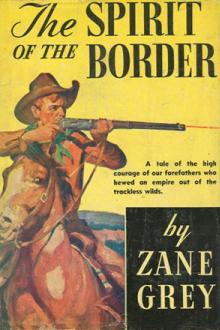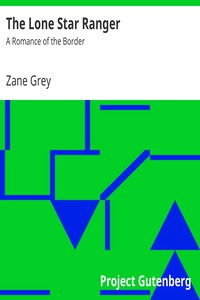The U. P. Trail, Zane Grey [robert munsch read aloud .txt] 📗

- Author: Zane Grey
Book online «The U. P. Trail, Zane Grey [robert munsch read aloud .txt] 📗». Author Zane Grey
“Collins, there’s more domnable things than yez ever heerd of.... I’ll sthop Gineral Lodge!”
The brawny Irishman wheeled and strode back toward the front car of the train. All the crowd,—to a man, muttering and gaping, followed him. Casey climbed up on the gravel-car.
“Casey, wot in hell would yez be afther doin’?” demanded McDermott.
Casey grinned at his old comrade. “Mac, yez do me a favor. Uncouple the car.”
McDermott stepped between the cars and the rattle and clank of iron told that he had complied with Casey’s request. Collins, with all the men on the ground, grasped Casey’s idea.
“By God! Casey can you do it? There’s down-grade for twenty miles. Once start this gravel-car and she’ll go clear to the hills. But—but—”
“Collins, it’ll be aisy. I’ll slip through thot pass loike oil. Thim Sooz won’t be watchin’ this way. There’s a curve. They won’t hear till too late. An’ shure they don’t niver obsthruct a track till the last minute.”
“But, Casey, once through the pass you can’t control that gravel-car. The brakes won’t hold. You’ll run square into the general’s train—wreck it!”
“Naw! I’ve got a couple of ties, an’ if thot wreck threatens I’ll heave a tie off on the track an’ derail me private car.”
“Casey, it’s sure death!” exclaimed Collins. His voice and the pallor of his face and the beads of sweat all proclaimed him new to the U. P. R.
“Me boy, nothin’s shure whin yez are drillin’ with the Paddies.”
Casey was above surprise and beyond disdain. He was a huge, toil-hardened, sun-reddened, hard-drinking soldier of the railroad, a loquacious Irishman whose fixed grin denied him any gravity, a foreman of his gang. His chief delight was to outdo his bosom comrade, McDermott. He did not realize that he represented an unconquerable and unquenchable spirit. Neither did his comrade know. But under Casey’s grin shone something simple, radiant, hard as steel.
“Put yer shoulders ag’in’ an’ shove me off,” he ordered.
Like automatons the silent laborers started the car.
“Drill, ye terriers, drill! Drill, ye terriers, drill!” sang Casey, as he stood at the wheel-brake.
The car gathered momentum. McDermott was the last to let go.
“Good luck to yez!” he shouted, hoarsely.
“Mac, tell thim yez saw me!” called Casey. Then he waved his hand in good-by to the crowd. Their response was a short, ringing yell. They watched the car glide slowly out of sight.
For a few moments Casey was more concerned with the fact that a breeze had blown out his pipe than with anything else. Skilful as years had made him, he found unusual difficulty in relighting it, and he would not have been beyond stopping the car to accomplish that imperative need. When he had succeeded and glanced back the station was out of sight.
Casey fixed his eyes upon the curve of the track ahead where it disappeared between the sage-covered sandy banks. Here the grade was scarcely perceptible to any but experienced eyes. And the gravel-car crept along as if it would stop any moment. But Casey knew that it was not likely to stop, and if it did he could start it again. A heavy-laden car like this, once started, would run a long way on a very little grade. What worried him was the creaking and rattle of wheels, sounds that from where he stood were apparently very loud.
He turned the curve into a stretch of straight track where there came a perceptible increase in the strength of the breeze against his face. While creeping along at this point he scooped out a hole in the gravel mound on the car, making a place that might afford some protection from Indian bullets and arrows. That accomplished, he had nothing to do but hold on to the wheel-brake, and gaze ahead.
It seemed a long time before the speed increased sufficiently to insure him against any danger of a stop. The wind began to blow his hair and whip away the smoke of his pipe. And the car began to cover distance. Several miles from the station he entered the shallow mouth of a gully where the grade increased. His speed accelerated correspondingly until he was rolling along faster than a man could run. The track had been built on the right bank of the gully which curved between low bare hills, and which grew deeper and of a rougher character. Casey had spiked many of the rails over which he passed.
He found it necessary to apply the brake so that he would not take the sharp curves at dangerous speed. The brake did not work well and gave indications that it would not stand a great deal. With steady, rattling creak, and an occasional clank, the car rolled on.
If Casey remembered the lay of the land, there was a long, straight stretch of track, ending in several curves, the last of which turned sharply into the narrow cut where the Sioux would ambush and obstruct the train. At this point it was Casey’s intention to put off the brake and let his car run wild.
It seemed an endless time before he reached the head of that stretch. Then he let go of the wheel. And the gravel-car began to roll on faster.
Casey appeared to be grimly and conscientiously concerned over his task, and he was worried about the outcome. He must get his car beyond that narrow cut. If it jumped the track or ran into an obstruction, or if the Sioux spied him in time, then his work would not be well done. He welcomed the gathering momentum, yet was fearful of the curve he saw a long distance ahead. When he reached that he would be going at a high rate of speed—too fast to take the curve safely.
A little dimness came to Casey’s eyes. Years of hot sun and dust and desert wind had not made his eyes any stronger. The low gray walls, the white bleached rocks, the shallow stream of water, the fringe of brush, and the long narrowing track—all were momentarily indistinct in his sight. His breast seemed weighted. Over and over in his mind revolved the several possibilities that awaited him at the cut, and every rod of the distance now added to his worry. It grew to be dread. Chances were against him. The thing intrusted to him was not in his control. Casey resented this. He had never failed at a job. The U. P. R. had to be built—and who could tell?—if the chief engineer and all his staff and the directors of the road were massacred by the Sioux, perhaps that might be a last and crowning catastrophe.
Casey had his first cold thrill. And his nerves tightened for the crisis, while his horny hands gripped on the brake. The car was running wild, with a curve just ahead. It made an unearthly clatter. The Indians would hear that. But they would have to be swift, if he stayed on the track. Almost before he realized it the car lurched at the bend. Casey felt the off-side





Comments (0)